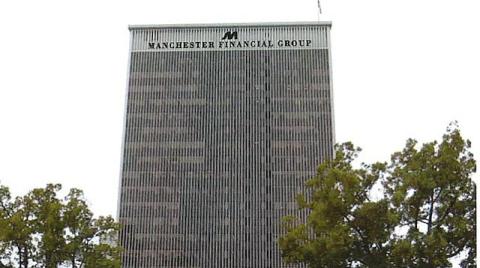[ESPAÑOL]
Arturo Castañares
Editor-at-Large
A spokesperson for San Diego Mayor Kevin Faulconer denies the Mayor engaged in political maneuvers that led to the City leasing the 101 Ash St. building, but the Mayor has not directly disputed the allegations or demanded a retraction.

The statement was in response to a September 11, 2020, story in La Prensa San Diego that reported allegations that Mayor Faulconer made the decision to pursue a lease instead of a purchase of the now-vacated building in order to distance himself from then-owner “Papa” Doug Manchester, one of his biggest campaign donors and political supporters.
Several persons that attended a high-level meeting in the Mayor’s office on September 6, 2016, confirm that Faulconer directed staff to only pursue a lease even after he was informed the change would cost taxpayers at least $16 million more than a direct purchase.
La Prensa San Diego independently confirmed with several sources that the Mayor said it would be politically damaging for him to be seen as allowing the City to pay Manchester directly, so they were ordered to pursue a lease through a middleman company that would, in turn, pay Manchester.
Doug Manchester received a $25 million payout one day after the close of the transaction where the City agreed to a $128 million, 20-year lease of the building.

Craig Gustafson, a mayoral spokesman, emailed La Prensa in response to repeated requests for comment. Gustafson previously worked as a reporter at the San Diego Union-Tribune when Doug Manchester owned the newspaper.
Gustafson made the denial in an email he said “you can attribute to me”, but the denial was not directly from the Mayor, referring to the Mayor in third-person by saying that “the premise of your articles is inaccurate and the allegations about the Mayor are false.”
However, Gustafson was not in the meeting, so his comments reflect information he must have received from yet-unnamed sources, which could include the Mayor or other staff members that attended the meeting, but Gustafson did not provide any names of his sources.
The email continued on to say that “[a]fter what just happened with NBC 7’s inaccurate reporting with fabricated information on this same topic, the public should be dubious about articles that have a clear political agenda and rely solely on anonymous sources that may or may not have been properly and thoroughly vetted.”
Gustafson’s comments reference a recent article by NBC 7 San Diego that included a document delivered anonymously to a reporter but which the station was later unable to independently verify, so the article was retracted by NBC.
The NBC story was not at all related to the allegations contained within the September 11, 2020, article in La Prensa San Diego. La Prensa independently confirmed the accounts in the story with multiple known sources that were in the meeting. La Prensa did not name the sources to protect their employment or careers.
Gustafson, as a former reporter and media spokesperson, knows that state law protects people from inaccurate or false media reporting by allowing a 20-day period to demand a correction or retraction.
In response to the NBC story, City Attorney Mara Elliott and Assemblyman Todd Gloria demanded retractions and, when unable to defend its own reporting, NBC was forced to retract the story.
California Code of Civil Procedures Section 48(a) states that someone must serve “a written notice specifying the statements claimed to be libelous and demanding that those statements be corrected. The notice and demand must be served within 20 days after knowledge of the publication or broadcast of the statements claimed to be libelous.”
No such demand for a correction or retraction was made about the September 11, 2020, story in La Prensa San Diego.
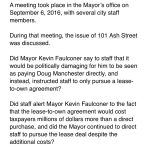
More importantly, La Prensa San Diego emailed Gustafson and the Mayor’s Chief of Staff before the story ran with a direct description of the allegations made by staffers who attended the meeting. Gustafson’s response ignored the allegations and instead included a general statement that has also been sent to other media outlets in response to questions about the 101 Ash deal.
Gustafson did not dispute or deny the allegations before the story ran, or during the 20 days after publication, but only did so two days after the retraction period ended.
At least two staff members from the Mayor’s office were in the September 6, 2016, meeting, including his then-Chief of Staff Stephen Puetz, who is now an outside political consultant, and Jack Straw, who managed Land Use policy and now works for Southwest Strategies, a lobbying firm that represented the owners of the 101 Ash building at the time of the sale. Neither one has denied the allegations in the story.
To date, no one who was actually in the meeting has disputed the allegations raised in the September 11, 2020, La Prensa San Diego story.
Lease vs Buy and Why It Matters

City staff had been negotiating to purchase the 101 Ash St. building for over a year, but a lease was not part of the discussions.
Doug Manchester bought a 49% interest in 101 Ash St. in July 2015 and the next week, a tour of the building was organized where Faulconer and top city administrators walked through the entire site.
The tour was organized by Jason Hughes, the real estate broker that had been serving as a non-paid advisor to the City since 2013 and later helped negotiate the deal between the sellers, Cisterra, and the City.
Cisterra Development later negotiated a $72.1 million purchase price and agreed to flip the building to the City through either a purchase or a lease.
Staff recommended a direct purchase using several financing mechanisms that would yield greater cost savings by using municipal bonds that carry lower interest rates compared to corporate financing available to Cisterra.
Municipal bonds would also have given the City the opportunity to refinance the debt after 10 years if interest rates were lower, but the lease deal locked in a higher interest rate for the entire 20-year term.
Leading up to the meeting in the Mayor’s office, an appraisal of the building had valued it at only $67.1 million, even though the sales price was $72.1 million, plus $5 million more the City was adding to be used for tenant improvements.
In the meeting at the Mayor’s office, the discussion of purchasing the building was met with aggressive opposition from the Mayor, so much so that multiple staffers describe him as the angriest they had ever seen him.
According to the staffers, the Mayor was clear it would be politically damaging to pay Manchester directly, and he directed staff to avoid even using Manchester’s name in any presentation or documents. From that day forward, there was no mention of Manchester in any documents, presentations, or discussions of the deal.
The senior staffers were directed by the Mayor to argue that some ambiguity existed in the Cisterra purchase agreement as to whether the City could buy the building directly from the sellers, including Manchester.
The day after that meeting, an email from Deputy Chief Operating Officer Ron Villa to staff explained that only a lease would be pursued, consistent with the Mayor’s order given the day before.
City staff then scrambled to create a legal agreement quickly because the deal was scheduled to go before the City Council’s Land Use Committee just two weeks later.
A lease agreement that had been used in 2015 by the City and Cisterra for the Civic Center Plaza building was edited to be used for the 101 Ash building. The deal was a 20-year, lease-to-own agreement that allowed Cisterra to simply flip the building to the City.
When the 101 Ash St. deal went before the Land Use Committee on September 21, 2016, the proposal was a 20-year lease-to-own offer where staff compared the prices of renting office spaces versus signing a long-term lease.
During the committee hearing, both Councilman Todd Gloria and David Alvarez asked why a purchase was not being considered, and staff and a Deputy City Attorney told the Councilmembers that it was not clear the City could buy the building directly, just as they had been directed to do by Mayor Faulconer.

When Councilman David Alvarez asked if the City would save more money through a direct purchase, staff admitted the lease would cost at least $16 million more than a purchase, but that a lease was the best way to proceed. Alvarez pushed staff why the City would not pursue a purchase and asked “why couldn’t we just enter into a separate agreement post the sale directly with Cisterra?” Staff again pushed the lease narrative and Alvarez agreed to go along with the deal.
[Alvarez released a statement last month saying that “we need a criminal investigation by local, state, or federal prosecutors in order to get to the truth”.]
Despite the additional costs and vague legal reasoning, Councilman Todd Gloria enthusiastically supported the proposal and thanked the staff for their work, including specifically acknowledging broker Jason Hughes and principals from Cisterra who attended the meeting.
Gloria spoke very positively of the building and the deal and acknowledged that the lease deal was more expensive than a “straight purchase”.
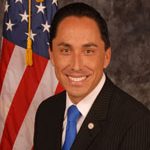
“This seems to be a very smart financial transaction,” Gloria said during the meeting. “Partnering with experts in the community and with folks that know how to get things done, everything about this sends a message to taxpayers that we kind of got our stuff together around here. I like a lot of what’s going on here and I just thank you very much.”
But before Gloria made the motion to move the deal forward, he asked how soon after the lease took effect “can the signage on the building be removed”, Gloria said with a smile at the staff, referring to Manchester’s company name on the building but without saying his name, just as staff was directed to do by the Mayor.
Gloria has long opposed Manchester over the developer’s opposition to gay marriage, so his avoidance of Manchester’s name seemed an odd occurrence to community leaders that take every opportunity to criticize and oppose the divisive developer.
When staff responded that the signage could be removed as soon as the lease began on January 1, 2017, Gloria then made the motion to approve the deal. All four members voted for the deal. [Watch video of committee discussion]
Full Council Ignores Warning Signs
The agreement then went before the City Council on October 14, 2016, where staff again presented the lease-to-own deal and argued it was cheaper than continuing to rent other office space in downtown.
Staff cut off any discussion about a direct purchase by saying that although the original agreement with Cisterra “originally offered the City several options including a purchase option through an assignment, subsequently Cisterra removed the purchase option which left only the lease-to-own option for the City”, just as the Mayor had directed them to do.
There is no documentation to support the fact that Cisterra removed the purchase option from the agreement or that the City attempted to enforce those provisions of the original agreement through seeking written consent from the sellers.
One item the staff did not discuss was the onerous liability waiver language on the first page of the agreement that protected the sellers and Cisterra from any liability for defects, repairs, or hazardous issues with the building.
That language, which spans two pages and is included in all capital letters, is unusual in lease agreements and would not be in a standard purchase agreement. State law requires specific written disclosure by sellers and written acceptance by buyers of hazardous materials, including asbestos, lead, and other toxic substances within a building. The agreement language was simply a blanket waiver.
The lease agreement structure circumvented state-required purchase disclosures with a long paragraph waiving all known and unknown conditions of the building.
Had the City entered into a standard Purchase and Sales Agreement (PSA), more detailed disclosures would have been required and would have protected taxpayers from unknown and potentially expensive repairs and mitigation of toxic materials.
The Independent Budget Analyst’s (IBA) office then advised the Council that its own report projected at least $17 million in additional savings through a purchase instead of a lease, and said the issue of legal questions related to the possibility of a direct purchase could be resolved by written consent of the sellers, Shapery and Manchester.
The IBA also mentioned that a confidential memo had been circulated to Councilmembers by the City Attorney’s office discussing legal aspects of a potential purchase, but that memo was never released to the public.
Councilman Todd Gloria made the motion to approve the deal, saying “for those of us that have been in it, it’s extremely well maintained” before concluding by making the motion to approve the deal. [Watch video of Council meeting discussion]
“I see this as win all the way around…it’s a better business arrangement for the taxpayers…it’s something I want to be a part of today so I’m happy to make that motion,” Gloria said.
The change to a lease-to-buy, which, according to people in the meeting, was directed by the Mayor, and later championed by Todd Gloria, exposed the City to millions in excess financing costs, in addition to yet-undetermined costs to remediate asbestos and other repairs needed to use the building which were recently estimated to be over $100 million.
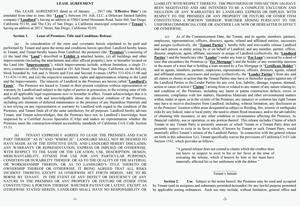
The Liability Waiver Language
Page 1 of the 58-page agreement includes waiver language that completely absolves the landlord, Cisterra, and the sellers, saying the building is “AS-IS AND WHERE IS”.
Unusually, the liability language is moved up to Page 1 of the agreement, and is written in all capital letters, a sign of the language’s importance.
The disclaimer states that the building is “AS IS” AND “WHERE IS”, and “IT BEING AGREED THAT ALL RISKS INCIDENT THERETO, EXCEPT AS OTHERWISE SET FORTH HEREIN, ARE TO BE BORNE BY TENANT”, that “LANDLORD SHALL HAVE NO RESPONSIBILITY OR LIABILITY”, and that it’s “A COMPLETE EXCLUSION AND NEGATION OF ANY WARRANTIES BY LANDLORD.”
The language is so important that it required the initials of someone from the City to acknowledge the waiving of California Code of Civil Procedures 1542 which protects buyers from unknown defects.
The 1542 waiver means that the City waived any and all claims to any defects, deficiencies, and other material problems with the building and released the seller/landlord, Cisterra, and therefore the sellers, Shapery and Manchester, from all legal liability for issues, including asbestos, seismic retrofits, fire sprinklers, and other mechanical repairs that have now been discovered.
Council Members who have spoken publicly since the approval of the lease agreement maintain that they were not properly advised as to the serious liability waiver language that left the City completely at risk for all issues with the building.
The final agreement was executed by City Attorney Mara Elliott’s office on December 19, 2016, one week after she was sworn into office. La Prensa San Diego has reported that Elliott had access to the office and staff for five weeks before the agreement was signed, but she maintains that she “was not in office when this deal was approved.”
Disclosure of All Parties
At the time of the agreement, San Diego City Charter Section 225 required that a party to a contract with the City “makes a full and complete disclosure of the name and identity of any and all persons directly or indirectly involved in the application or proposed transaction and the precise nature of all interests of all persons therein.”
Cisterra disclosed to City staff the names of its principals, Jason Wood and Steve Black, but may not have disclosed the names of all owners of the building or other persons that received proceeds from the transaction.
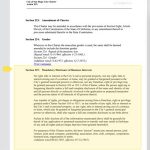
Section 225 provided that “failure to fully disclose all of the information enumerated above shall be grounds for denial of any application or transfer and may result in forfeiture of any and all rights and privileges that have been granted”.
Although the reported building sales prices was $72.1 million plus $5 million for tenant improvements, Cisterra has admitted it received $91.8 million in proceeds for financing the building after the City signed the $128 million lease.
Cisterra has not documented where more than $14 million of their financing proceeds went or who received those funds.
One person that is suspected of having received part of those funds is Jason Hughes, the City’s “pro-bono” real estate broker that was instrumental in securing the building deal. Hughes was included in nearly every email between the City and Cisterra and also met directly with Mayor Faulconer during the time the deal was being negotiated.
Several people with knowledge of the deal claim Hughes received a large fee from the building sellers, creating a conflict of interest for him if he was working for both the City and the sellers on the deal. The City never signed a dual agency agreement that could have allowed Hughes to work both sides of the deal.

La Prensa San Diego has tried to contact Hughes to confirm whether he received any fees from the deal by leaving multiple phone messages, several emails, and asking his assistant to relay messages to him, but no one has responded in over four weeks. After several Twitter messages from La Prensa San Diego and others directly to Hughes, he deleted his Twitter account.
Hughes is Chairman, CEO, and owner of Hughes Marino, a real estate company focused solely on representing tenants in office negotiations. His wife, Shay Hughes, the company’s President, COO, and owner did not respond to an email request for comment.
Any payment made to any undisclosed persons, including Hughes, would violate the Charter provisions and could invalidate the agreement.
Unlawful, Illegal, or Ill-Advised

Former City Attorney Michael Aguirre filed a lawsuit on August 18, 2020, against the former owners of the building in a bid to force the City to stop making its $545,000 monthly lease payment because the building has been vacated due to asbestos exposure and is functionally unusable. The City evacuated all employees from the building after inspections revealed needed repairs and upgrades related to mechanical, structural, and environmental issues.
The City stopped its September lease payment last month. Two weeks later, a trustee representing insurance companies that bought corporate bonds secured by the City’s lease payments filed a legal claim, the first step before a lawsuit. The lenders expect their payments under the lease and, if the lease deal is invalidated or voided, they could repossess the building or seek a refund of their $91.8 million from Cisterra.
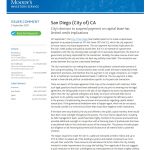
On September 9, 2020, Moody’s Investors Service issued a letter relating to the 101 Ash St. deal concluding that “[t]here are aspects of the lease agreement that may not be compliant with state law”, and that “repairs required to make 101 Ash St. usable are estimated at $66.0 million and up to $115.0 million to replace all of the building’s systems and related components as most are past their useful life.”
The City has now also withheld its October payment this week.
Given the finger-pointing and process that led to the agreement and the missteps that occurred after the City began making tenant improvements, more lawsuits seem certain to fly in several directions.
Although the building transaction was completed in December 2016, the subsequent construction issues brought the entire process back under review. External investigations are now ongoing and others could follow, including criminal investigations related to possible fraud, misrepresentations, and misappropriation of public funds.
This week, the City Council will be briefed in closed session on Tuesday by City Attorney Mara Elliott’s office as to the status of the building and, presumably, all pending and anticipated lawsuits.
Follow the Money
Owners of Cisterra, lobbyists, and others involved in the 101 Ash agreement donated tens of thousands of dollars to elected officials that approved the deal.

According to the San Diego Reader, $23,675 in contributions have gone directly to Todd Gloria’s campaigns from people directly involved in the 101 Ash deal, including $4,200 from Jason Hughes to Gloria’s Assembly campaign the year before championing the 101 Ash deal, and $2,300 for Gloria’s mayor campaign since the deal was approved; in addition to money from lobbyists from Ledford Enterprises, and from law firms Cooley LLP, and Sheppard Mullin Richter & Hampton who represented clients involved in the deal
Jason Hughes and his wife also gave four contributions to Mara Elliott’s campaign for City Attorney while the deal was being approved in 2016.
Political contributions were also made by lobbyists from California Strategies that represented Cisterra during the 101 Ash deal, and lobbyists from Southwest Strategies that represented the 101 Ash St. sellers, Shapery and Manchester.
Mara Elliott did not respond to a request for comment and has never requested a retraction of any story about her.
Todd Gloria has not responded to several requests for comment and for an interview, and has never requested a retraction of any story about him.
Mayor Kevin Faulconer has not denied the allegations attributed to him and has not demanded a connection or retraction.
No person in the September 6, 2016, meeting has denied or contradicted the story, and no one demanded a correction or retraction within the 20 days provided by state law.
